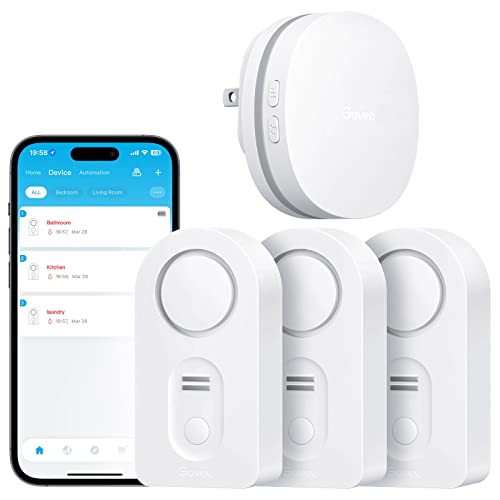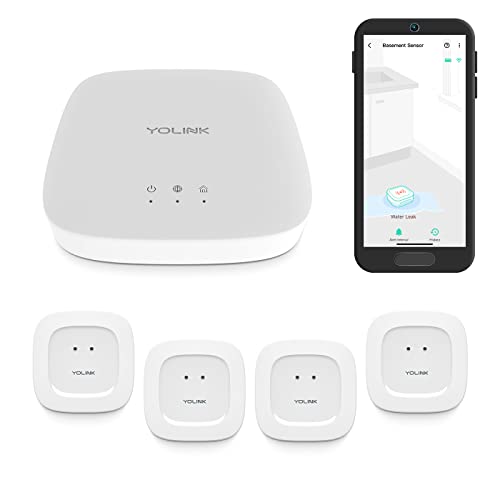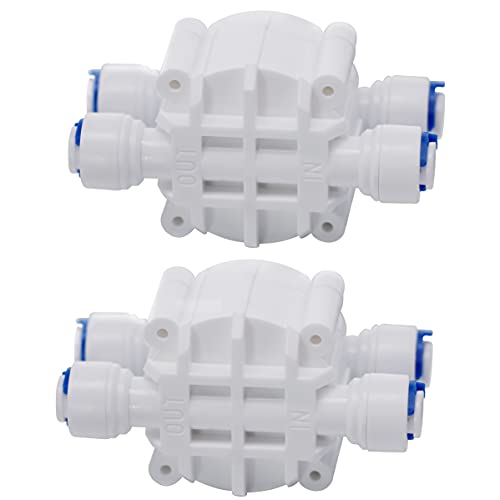Imagine coming home from a long day at work, only to find your basement flooded due to a water leak that went unnoticed for hours. The damage is extensive, the cost of repairs sky-high, and the frustration overwhelming. As homeowners, we’ve all experienced the anxiety and fear that comes with the possibility of water damage. But what if I told you there’s a simple solution that can save you from this nightmare? Enter smart water leak detectors. In this blog post, we will delve into the fascinating world of these innovative devices, exploring their features and functions, and ultimately empowering you to protect your home from potential water disasters. So buckle up and prepare to be amazed by the incredible capabilities of smart water leak detectors.
Top-rated Smart Water Leak Detectors: Stay ahead of potential water damage with these bestsellers
What are smart water leak detectors?
Water leaks can cause significant damage to residential and commercial properties, leading to costly repairs and increased water bills. Smart water leak detectors are innovative devices that aim to prevent such issues by continuously monitoring water usage and promptly detecting leaks. In this blog section, we will explore the features and benefits of these devices, as well as provide real-life examples of popular brands and models.
How do smart water leak detectors work?
Smart water leak detectors utilize advanced sensors and technologies to detect leaks and monitor water usage. These devices are typically installed at key points in a plumbing system, such as near water heaters, under sinks, or in basements. Here’s a breakdown of the working mechanism:
- Sensors: Smart leak detectors employ various sensors, including moisture sensors, pressure sensors, and flow sensors, to identify signs of water leakage. These sensors can detect even the smallest amounts of water, ensuring early detection.
- Connectivity: Most smart leak detectors connect to a home’s Wi-Fi network, enabling real-time monitoring and remote access. This connectivity allows users to receive instant notifications via mobile apps or email alerts when a leak is detected.
- Data Analysis: Smart leak detectors analyze water usage patterns and flow rates to identify abnormal behavior. Algorithms and machine learning techniques are often used to distinguish between normal water usage and potential leaks, reducing false alarms.
- Alerts and Notifications: When a leak is detected, smart leak detectors send alerts to homeowners or property managers. These alerts can be customized to include information about the location of the leak, water flow rate, and even shut-off valve control options.
Benefits of using smart water leak detectors
Investing in smart water leak detectors can provide numerous benefits, including:
- Early Leak Detection: By detecting leaks early on, smart leak detectors help prevent extensive damage to properties and reduce repair costs.
- Water Conservation: Smart leak detectors promote water conservation by monitoring usage and identifying inefficient or wasteful water practices.
- Remote Monitoring: With the ability to monitor water usage remotely, homeowners and property managers can stay informed and take immediate action, even when away from the property.
- Insurance Savings: Many insurance companies offer discounts to homeowners who install smart leak detectors. These devices demonstrate a proactive approach to preventing water damage, reducing insurance premiums.
Examples of popular smart water leak detectors
Here are a few examples of popular smart water leak detectors available in the market:
- Fibaro Flood Sensor: This compact sensor can be placed anywhere in the home and provides real-time alerts via a mobile app. It also features a built-in siren to alert occupants of potential leaks.
- Flo by Moen: Flo is an intelligent water monitoring and shut-off system that detects leaks and automatically shuts off the water supply to prevent further damage. It offers detailed insights into water usage and allows for remote control via a mobile app.
- Phyn Plus: Phyn Plus is a smart water assistant that continuously monitors water usage and detects leaks with high accuracy. It provides detailed insights and analytics on water consumption, allowing users to make informed decisions about water conservation.
Key features of smart water leak detectors
Water leaks can cause significant damage to your home, leading to costly repairs and potential health hazards. Fortunately, smart water leak detectors are designed to detect leaks early and prevent further damage. In this blog post, we will explore the key features that make these devices effective in detecting and preventing water leaks.
Real-Time Monitoring
One of the most important features of smart water leak detectors is their ability to provide real-time monitoring. These devices constantly monitor the water flow in your home and can detect even the smallest leaks. Once a leak is detected, the device sends an alert to your smartphone or tablet, allowing you to take immediate action. Real-time monitoring ensures that you are aware of any leaks as soon as they happen, giving you the opportunity to address the issue promptly.
Automatic Shut-Off Valves
Smart water leak detectors often come equipped with automatic shut-off valves. These valves are designed to cut off the water supply to your home in the event of a leak, preventing further damage. When a leak is detected, the device triggers the shut-off valve, stopping the flow of water. This feature is particularly useful if you are away from home or unable to respond to the alert immediately. By automatically shutting off the water supply, these devices can significantly minimize the potential damage caused by leaks.
Mobile App Integration
Another key feature of smart water leak detectors is their integration with mobile apps. These apps allow you to monitor the status of your device and receive alerts directly on your smartphone or tablet. With a mobile app, you can easily check the water flow in your home, view historical data, and set up customized notifications. Some apps even offer additional features, such as the ability to remotely control the shut-off valve or receive detailed reports on water usage. Mobile app integration enhances the convenience and accessibility of smart water leak detectors, allowing you to stay informed and take action from anywhere.
Compatibility with Smart Home Devices
Smart water leak detectors are designed to seamlessly integrate with other smart home devices. This compatibility allows you to create a comprehensive smart home ecosystem that works together to protect your home. For example, you can connect your smart water leak detector with your smart thermostat to automatically shut off the HVAC system when a leak is detected. You can also integrate it with your smart home security system to trigger an alarm in case of a leak. The ability to connect and communicate with other smart home devices enhances the overall effectiveness and functionality of the water leak detector.
How do smart water leak detectors work?
Smart water leak detectors are innovative devices that help homeowners and businesses detect and prevent water damage caused by leaks. These detectors utilize various sensors and cutting-edge technology to monitor water levels, detect leaks, and send timely alerts to users’ smartphones or other connected devices. In this section, we will explore the working mechanism of smart water leak detectors, including the types of sensors used and how they communicate with the central hub.
Moisture Sensors
One of the key components of smart water leak detectors is the moisture sensor. These sensors are designed to detect the presence of moisture or water in areas where leaks may occur, such as basements, bathrooms, kitchens, or laundry rooms. Moisture sensors can be placed in strategic locations, including near plumbing fixtures, water heaters, or under sinks.
When a leak occurs, the moisture sensor detects the presence of water and sends a signal to the central hub. This signal triggers an alert, which is then sent to the user’s smartphone or other connected devices. By detecting leaks early on, moisture sensors help prevent extensive damage and costly repairs.
Flow Sensors
Flow sensors are another type of sensor commonly used in smart water leak detectors. These sensors monitor the flow of water in plumbing systems and can detect abnormal flow patterns that may indicate a leak. Flow sensors are typically installed at the main water supply line or specific points in the plumbing system.
Flow sensors work by measuring the rate of water flow. If the flow exceeds a certain threshold or deviates significantly from the normal flow pattern, it indicates a potential leak. The sensor sends a signal to the central hub, which then alerts the user. Flow sensors are particularly useful in detecting leaks in larger plumbing systems or areas where water usage is high, such as commercial buildings or irrigation systems.
Temperature Sensors
In addition to moisture and flow sensors, smart water leak detectors may also incorporate temperature sensors. These sensors monitor the temperature of the water or the surrounding environment and can detect changes that may indicate a leak or pipe freeze.
For example, if a pipe freezes and starts to thaw, the temperature sensor will detect the change in temperature and trigger an alert. This alert can help prevent burst pipes and subsequent water damage. Temperature sensors are especially valuable in colder climates or areas where freezing pipes are a common concern.
Communication with Central Hub and Alerts
To ensure effective monitoring and timely alerts, smart water leak detectors rely on a central hub that acts as the control center for the system. The sensors communicate with the central hub wirelessly, using technologies such as Wi-Fi, Bluetooth, or Zigbee.
When a sensor detects moisture, abnormal flow, or temperature changes, it sends a signal to the central hub. The central hub then processes the information and sends an alert to the user’s smartphone or other connected devices. The alert may include details about the location of the leak or abnormality, allowing users to take immediate action.
Benefits of Smart Water Leak Detectors
Smart water leak detectors offer several benefits that can help homeowners and businesses proactively protect their properties from water damage. These benefits include:
- Early detection of leaks, minimizing the risk of extensive damage and costly repairs.
- Timely alerts sent to users’ smartphones or other connected devices, ensuring prompt action can be taken.
- Remote monitoring capabilities, allowing users to check the status of their property in real-time, even when away.
- Integration with other smart home devices, such as smart thermostats or shut-off valves for automated response to leaks.
- Potential insurance discounts for installing smart water leak detectors, as they demonstrate a commitment to risk prevention.
In conclusion, smart water leak detectors utilize moisture sensors, flow sensors, and temperature sensors to detect leaks and abnormal water conditions. These sensors communicate with a central hub, which sends alerts to users’ smartphones or other connected devices. By using advanced technology and providing real-time monitoring, smart water leak detectors offer a proactive and efficient solution to prevent water damage.
Factors to consider when choosing a smart water leak detector
Smart water leak detectors are becoming increasingly popular among homeowners as an effective way to prevent water damage and costly repairs. However, with so many options available in the market, it can be overwhelming to choose the right one for your specific needs. In this blog section, we will outline the key factors to consider when selecting a smart water leak detector to help you make an informed decision.
1. Compatibility with Existing Plumbing Systems
One of the first factors to consider is the compatibility of the smart water leak detector with your existing plumbing systems. It is essential to ensure that the detector can be easily integrated into your home’s plumbing infrastructure without requiring extensive modifications or additional equipment. Some detectors are specifically designed for certain types of pipes or fittings, so it’s crucial to choose one that matches your specific plumbing setup.
2. Installation Requirements
The ease of installation is another crucial factor to consider. Look for a smart water leak detector that offers a straightforward and hassle-free installation process. Some detectors can be easily installed by homeowners themselves, while others may require professional assistance. Consider your comfort level with DIY installations and choose accordingly.
3. Battery Life
A smart water leak detector relies on batteries to function effectively. Therefore, it is important to consider the battery life of the detector before making a purchase. Look for a detector that offers a long-lasting battery life to minimize the need for frequent battery replacements or recharging. Some detectors even come with rechargeable batteries, providing added convenience and cost savings in the long run.
4. Reliability and Sensitivity
The reliability and sensitivity of the smart water leak detector are paramount. You want a detector that can accurately detect even the smallest leaks at an early stage to prevent significant water damage. Look for detectors with high-quality sensors that can detect leaks quickly and send alerts to your smartphone or home automation system promptly.
5. Connectivity and Alert System
Consider the connectivity options and alert system offered by the smart water leak detector. Most detectors connect to your home’s Wi-Fi network and send real-time alerts to your smartphone or email when a leak is detected. Some detectors also offer integration with home automation systems, allowing you to automate actions such as shutting off the water supply when a leak is detected. Choose a detector that offers the connectivity options and alert system that best suit your needs.
6. Additional Features
Lastly, consider any additional features that may enhance the functionality and convenience of the smart water leak detector. These may include automatic shut-off valves, temperature sensors, humidity sensors, or even integration with voice assistants such as Amazon Alexa or Google Assistant. Assess which additional features are important to you and choose a detector that offers them.
To summarize, when choosing a smart water leak detector, it is crucial to consider factors such as compatibility with existing plumbing systems, installation requirements, battery life, reliability and sensitivity, connectivity and alert system, and additional features. By carefully evaluating these factors and comparing different products in the market, you can make an informed decision and select a smart water leak detector that best meets your needs.
Key Points to Consider:
- Compatibility with existing plumbing systems
- Ease of installation
- Battery life
- Reliability and sensitivity
- Connectivity and alert system
- Additional features
Remember to thoroughly research and compare different brands and models to find the perfect smart water leak detector that offers the features and functionality you require.
Key Takeaways and Final Thoughts
In conclusion, it is evident that smart water leak detectors play a crucial role in protecting homes and properties from water damage. By comprehending the various features and functions of these devices, individuals can make informed decisions when selecting the most suitable option. Factors such as real-time monitoring, seamless integration with existing systems, and dependable alert notifications should be considered when choosing a device. By employing these recommendations, homeowners can effectively safeguard their properties and mitigate the potential financial burden of repairs caused by water leaks.











I recently installed a smart water leak detector in my home and it has been a game-changer. It alerted me to a leak in my basement before it caused any major damage. Highly recommend!
One important factor to consider when choosing a smart water leak detector is the compatibility with existing smart home systems, such as Google Home or Amazon Alexa.
That’s a great point! Compatibility with existing smart home systems is definitely an important factor to consider when choosing a smart water leak detector. Thank you for sharing this valuable information!
Thank you for sharing your positive experience with a smart water leak detector! It’s great to hear that it helped you prevent any major damage. It’s definitely a valuable investment for homeowners.
I would love to see an article on how to install and set up a smart water leak detector. I’m interested in getting one for my home but I’m not sure how to go about it.
Thank you for your suggestion! I’ll definitely consider covering the installation and setup process of smart water leak detectors in a future article. Stay tuned!